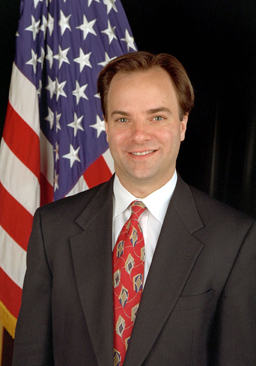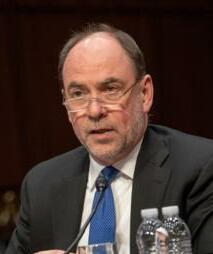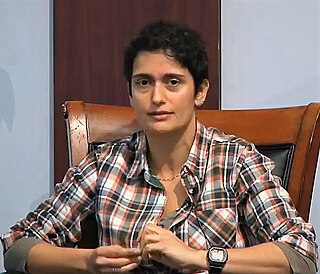
Health economics is a branch of economics concerned with issues related to efficiency, effectiveness, value and behavior in the production and consumption of health and healthcare. Health economics is important in determining how to improve health outcomes and lifestyle patterns through interactions between individuals, healthcare providers and clinical settings. In broad terms, health economists study the functioning of healthcare systems and health-affecting behaviors such as smoking, diabetes, and obesity.

Mark Barr McClellan is the director of the Robert J Margolis Center for Health Policy and the Margolis Professor of Business, Medicine and Health Policy at Duke University. Formerly, he was a senior fellow and director of the Health Care Innovation and Value Initiative at the Engelberg Center for Health Care Reform at The Brookings Institution, in Washington, D.C. McClellan served as commissioner of the United States Food and Drug Administration under President George W. Bush from 2002 through 2004, and subsequently as administrator of the Centers for Medicare and Medicaid Services from 2004 through 2006.
The Harkness Fellowship is a program run by the Commonwealth Fund of New York City. This fellowship was established to reciprocate the Rhodes Scholarships and enable Fellows from several countries to spend time studying in the United States.

Kenneth George "Ken" Binmore, is an English mathematician, economist, and game theorist, a Professor Emeritus of Economics at University College London (UCL) and a Visiting Emeritus Professor of Economics at the University of Bristol. As a founder of modern economic theory of bargaining, he made important contributions to the foundations of game theory, experimental economics, evolutionary game theory and analytical philosophy. He took up economics after holding the Chair of Mathematics at the London School of Economics. The switch has put him at the forefront of developments in game theory. His other interests include political and moral philosophy, decision theory, and statistics. He has written over 100 scholarly papers and 14 books.
David Bruce Audretsch is an American economist. He is a distinguished professor at the School of Public and Environmental Affairs (SPEA) at Indiana University and also serves as director of the SPEA International Office, Ameritech Chair of Economic Development, and director of SPEA's Institute for Development Strategies (IDS). He is co-founder and co-editor of Small Business Economics: An Entrepreneurship Journal, and also works as a consultant to the United Nations, the World Bank, the OECD, the EU Commission, and the U.S. Department of State. He was the director of the Entrepreneurship, Growth and Public Policy Group at the Max Planck Institute of Economics in Germany from 2003 to 2009. Since 2020, he also serves as a distinguished professor in the Department of Innovation Management and Entrepreneurship at the University of Klagenfurt.

Tomas J. Philipson is a Swedish-born American economist who served as the Acting Chairman of the Council of Economic Advisers in the Trump administration. He departed from the position and the Council at the end of June, 2020, to return to the University of Chicago. He holds the Daniel Levin Chair in Public Policy at the University of Chicago, with posts in the Harris School of Public Policy Studies, Department of Economics, and the Law School. He was a Director of the Becker Friedman Institute at the university.

Douglas James "Doug" Holtz-Eakin is an American economist. He was formerly an economics professor at Syracuse University, director of the Congressional Budget Office, and chief economic policy adviser to Senator John McCain's 2008 presidential campaign. Holtz-Eakin is currently president of the American Action Forum policy institute, a conservative think tank.

Richard David Portes CBE is a professor of Economics and an Academic Director of the AQR Asset Management Institute at London Business School. He was President of the Centre for Economic Policy Research, which he founded. He also serves as Directeur d'Etudes at the Ecole des Hautes Etudes en Sciences Sociales in Paris.

Carlo Carraro is the chancellor of the University of Venice for the three-year period 2009–2012, with a two-year extension of his mandate in accordance to the Gelmini University Law bringing it up to summer 2014. He is also professor of environmental economics at the same university. He is director of the Sustainable Development Programme of the Fondazione Eni Enrico Mattei and director of the Climate Impacts and Policy Division of the Euro-Mediterranean Center for Climate Change (CMCC). In 2008, Carraro was elected vice-chair of the Working Group III and member of the bureau of the Nobel Laureate Intergovernmental Panel on Climate Change (IPCC).
Joseph P. Newhouse is an American economist and the John D. MacArthur Professor of Health Policy and Management at Harvard University, as well as the Director of the Division of Health Policy Research and of the Interfaculty Initiative on Health Policy. At Harvard, he is a member of the four faculties at Harvard Kennedy School in Cambridge, Harvard Medical School in Boston, Harvard T.H. Chan School of Public Health in Boston, and Harvard Faculty of Arts and Sciences in Cambridge.

Ariel Beresniak is a Swiss specialist in Public Health and Health Economics, author of reference books and scientific articles in modeling and decision-making analyses.
The William B. Graham Prize for Health Services Research is an award acknowledging contributions to health care research. It is funded by the Baxter International Foundation, and awarded every year through the US-based Association of University Programs in Health Administration (AUPHA). The recipient is awarded $25,000, with another $25,000 given to a non-profit institution selected by him or her.

Gillian Catherine Leng, Lady Cosford CBE is a British health administrator, academic, visiting professor at King's College London and the former Chief Executive of the National Institute for Health and Care Excellence (NICE), where she was responsible for several programmes and guidelines including the guidelines on COVID-19. In 2023 she was elected president-elect of the Royal Society of Medicine (RSM).
Walter Werner Holland was an epidemiologist and public health physician.

Louis Preston Garrison Jr. is an American health economist who has made significant contributions to pharmacoeconomics, pharmacogenomics and personalized medicine, regulatory benefit-risk analysis, insurance, pricing, reimbursement and risk-sharing agreements. He also made numerous contributions on the economic evaluation of pharmaceuticals, diagnostics, devices, surgical procedures, and vaccines, particularly as related to organ transplantation, influenza, measles, obesity, and cancer. Garrison has published over a hundred manuscripts in peer-reviewed journals and contributed to several book chapters.
ISPOR—The Professional Society for Health Economics and Outcomes Research, better known as ISPOR, is a nonprofit global professional organization in health economics and outcomes research. It was founded in 1995 as an international multidisciplinary professional organization that advances the policy, science, and practice of pharmacoeconomics and outcomes research. The society's mission is to promote health economics and outcomes research to improve decision making for health globally.
Alan Keith Maynard was a British health economist.
Jonathan Haskel is a British economist, and professor of economics at Imperial College Business School.

Kalipso Chalkidou is the Head of Health Finance at The Global Fund to Fight AIDS, Tuberculosis and Malaria and a Visiting Professor at Imperial College London. Previously she was Director of Global Health Policy at the Center for Global Development and Professor of Practice in Global Health at Imperial College London. Her research considers how local expertise can inform the allocation of scientific and healthcare resources.
The Department of Economics is an academic department of the University of Oxford within the Social Sciences Division. Relatively recently founded in 1999, the department is located in the Norman Foster-designed Manor Road Building.











